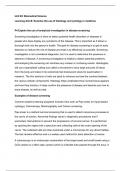Essay
Unit 20 - Learning Aim B Distinction Achieved
- Vak
- Instelling
All Criteria Achieved, Explains the use of analytical investigation in disease screening, Explains the use of analytical investigations of tissue samples', Explains the use of informatics and data handling in biomedical science, Analyses how the interpretation of diagnostic test results is use...
[Meer zien]




